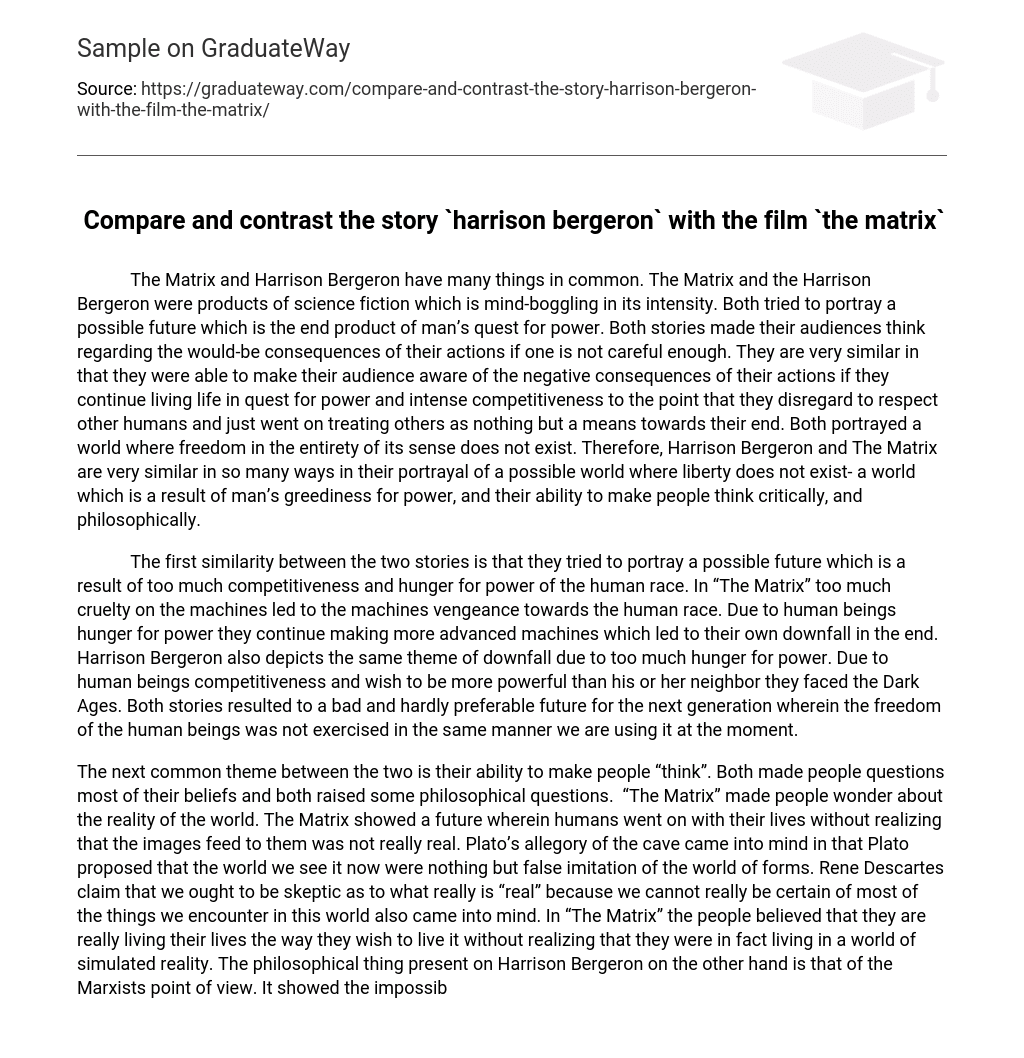The Matrix and Harrison Bergeron have many things in common. Both are products of science fiction, which is mind-boggling in its intensity. They both attempt to portray a possible future that is the end product of man’s quest for power. Both stories make their audiences think about the potential consequences of their actions if they are not careful enough.
They are very similar in that they make their audience aware of the negative consequences of pursuing power and intense competitiveness to the point where they disregard respecting other humans and treat them as nothing but a means towards their end. Both stories depict a world where freedom does not exist in its entirety.
Therefore, Harrison Bergeron and The Matrix are similar in so many ways in portraying a possible world where liberty does not exist – a world that results from man’s greed for power. They both have the ability to make people think critically and philosophically.
The first similarity between the two stories is that they both attempt to portray a possible future resulting from the human race’s excessive competitiveness and hunger for power. In The Matrix,” the machines’ cruelty towards humans led to their vengeance against humanity. The humans’ insatiable desire for power drove them to create increasingly advanced machines, ultimately leading to their own downfall. Similarly, Harrison Bergeron depicts a future where humans’ competitive nature and thirst for power resulted in the Dark Ages. Both stories present a bleak and undesirable future for subsequent generations, where human freedom is not exercised in the same manner as it is today.
The next common theme between the two is their ability to make people “think”. Both made people question most of their beliefs and raised philosophical questions. “The Matrix” made people wonder about the reality of the world. It showed a future where humans went on with their lives without realizing that the images fed to them were not real. This brought Plato’s allegory of the cave to mind, wherein he proposed that what we see in this world is nothing but false imitations of the world of forms. Rene Descartes’ claim that we ought to be skeptical as to what really is “real” because we cannot be certain about most things in this world also came into mind. In “The Matrix”, people believed they were living their lives as they wished, unaware they were in a simulated reality.
The philosophical aspect present in Harrison Bergeron, on the other hand, is from a Marxist point of view. It shows how living in an equal society is impossible since everything and everyone are made equal by handicapping those who are above average in beauty and intelligence with masks or tools. However, while attempting to produce an equal society, those in authority (like handicapper general Diana Moon Glampers) neglect being equal with others within society. Communism lures people into believing an equal society can exist; yet how could one say it’s truly equal when some must rule (to ensure equality remains), far overriding its basic tenet? Moreover, is equality preferable or does inequality remain necessary for smooth societal progress? These are only some philosophical questions raised by these two stories.
The third similarity between the two stories is the theme of freedom. In Harrison Bergeron,” the audience becomes aware of the necessity of human reasoning, just as they become aware of the importance of critical thinking. The story depicts a world where human freedom is severely restricted to the point where critical thinking and reasoning are forbidden for fear that humans will revert back to old ways. Lack of freedom is ever-present in this story, to the extent that individuals cannot even finish their own train of thought.
The same can be said for “The Matrix,” where human beings are unable to think independently. Their reality and thoughts are entirely dependent on machines that control them. Thus, true freedom in every sense of the word is absent from both stories.
To conclude, the two stories were similar in many ways. Both were science fiction and showed how human greed for power can lead to grave consequences. Additionally, both contained philosophical problems that gave audiences and readers something to ponder. In a way, both stories tried to caution us about the consequences of our actions if we are not careful. The stories also highlighted the importance of freedom. I commend those behind the film and short story for creating plots that are great to watch and interesting to think about.
References:
Harrison Bergeron is a short story written by Kurt Vonnegut Jr. in 1995.
The Matrix, released in 1999 and produced by Joel Silver.





